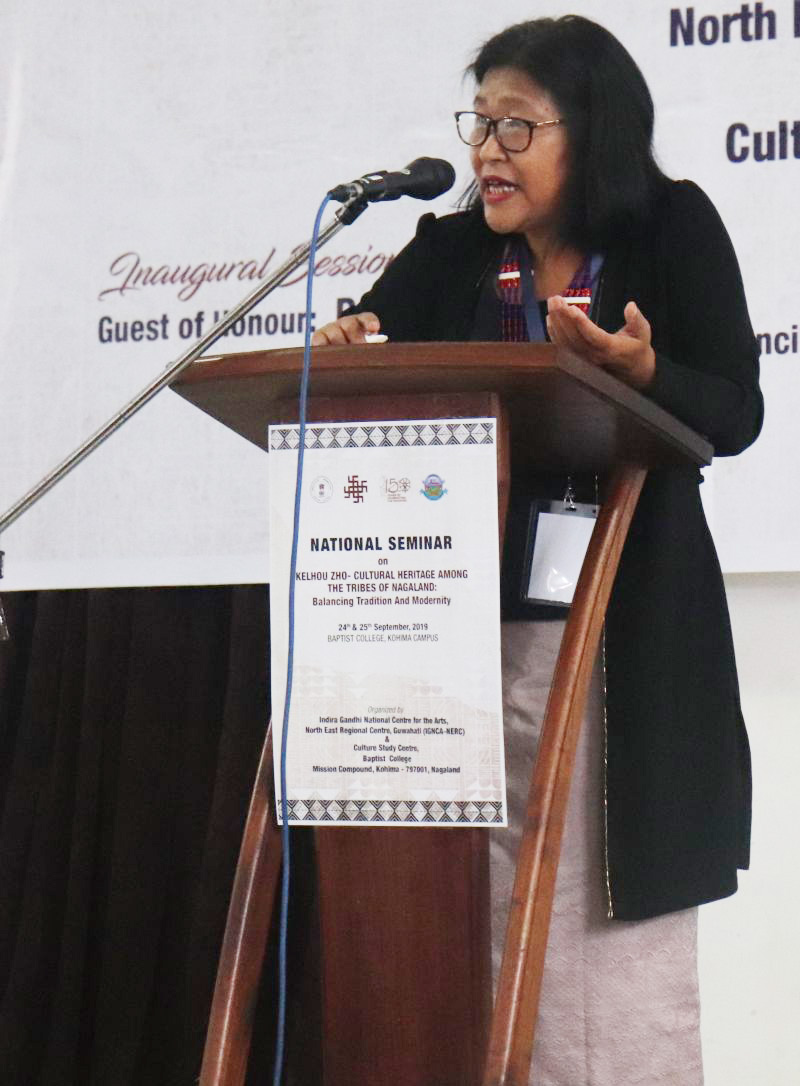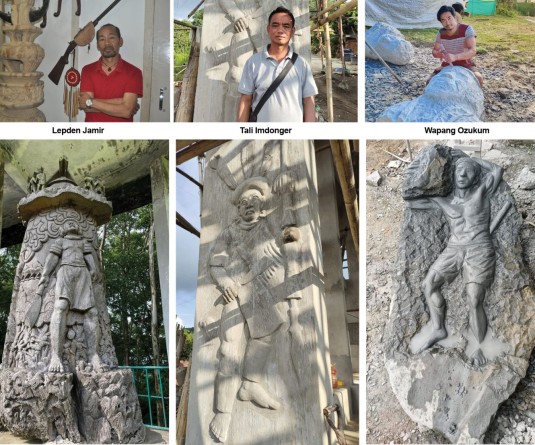National seminar on cultural heritage underway in Kohima

Dr. Anungla Aier delivers keynote address during national seminar held in Kohima on September 24. (Morung Photo)
Our Correspondent
Kohima | September 24
A two day long national seminar on “Kelhou Zho- cultural heritage among the tribes of Nagaland: balancing tradition and modernity” under the aegis of Indira Gandhi National Centre for the Arts, North East Regional Centre, Guwahati (IGNCA-NERC) and Culture Study Centre, Baptist College Kohima began at Baptist College, Kohima Campus on September 24.
Dr. Neiphi Kire, chairman Kohima Village Council graced the inaugural function as the guest of honour and stressed on the need to preserve and promote the rich culture and traditional values of Nagas.
He regretted that many traditional practices and cultures are diminishing with the passage of time by embracing the western culture and lifestyle.
Dr. Kire strongly hoped that such kind of seminar would make the tradition alive and enrich the knowledge to balance tradition and modernity.
Concept of cultural heritage
Dr Anungla Aier, retired director, Department of Higher Education in her keynote address said that the topic of the seminar carries not only an awesome load of responsibility but it also very succinctly expresses and depicts the issues facing every Naga community “as we constantly grapples with the ever present influences of our cultural past with the ground realities of the 21st Century.”
She said that the cultural heritage defined as a social and cultural legacy recognizes both tangible and intangible attributes of the social group that are inherited from past generations, maintained in the present and bestowed for the future generations.
“The concept of cultural heritage encapsulates the notion of culture as a social historical legacy that spans over time and space in the human journey as a social and cultural group wherein the culture they have developed as a people sustains them to cope with not only every possible challenges that life throws at them in their struggle to survive as a people but also gives meaning to their lives and legitimizes their sense of belongingness and identity as a people,” she said.
Balancing traditions and modernity
She stressed on the need to examine and understand that the Naga cultural heritage does not comprise of a single homogenous cultural assemblage.
“Every Naga present in this august gathering of academicians and researchers will agree that our people and our society over the last few decades have been witness to tremendous social and cultural changes. The contemporary culture we live in today as a modernizing and developing society is incomparable to the cultural traditions of our ancestors. I do not want to get into the discourse of tradition vis-a-vis modernity but suffice it to mention that these two conceptual frameworks are widely used as polar opposites in a linear theory of social and culture change,” she said.
However, she said, the all too common assumption/practice of putting tradition and modernity as paired opposites tends to overlook the mixtures and blending which reality depicts.
She said the balancing traditions and modernity in itself brings to mind many myriad issues.
“One ever present issue that jumps out in the Naga context is with regard to our oral traditions and folklores. The Naga society across all the different cultural groups is an oral society and the very identity of each constituent Naga community is rooted in their oral traditions,” she said.
She added that the tangible elements of our cultural heritage such as the textiles, the architecture and designs of our morung, village gate, the practice of various social mores and folkways, our traditional cuisine, social ethics, our traditional system of governance, and organization of our living spaces are all intricately linked with our folklores and oral traditions.
“It is such intangible heritage that lends values and meanings to the tangible elements mentioned above and many more. With modern education system gaining more and more grounds, the traditional institutions that channelized the continuity of such traditions are becoming rare,” she said.
Tradition of storytelling
Dr. Aier said “As Nagas we are only too familiar with the tradition of storytelling. If we are to listen to any historical accounts of our ancestral past, we find that the narrative, the song tell of events associated with specific geographical landmarks. Nagas by nature are territorial and not only many battles have been fought between rival clans and between villages based on such narratives but also reconciliation and peace pacts have been made between rivals.”
She said with modernity many such landmarks are no more visible and along with the changes in the geography of the landscape, the memory and the stories have also been forgotten. What then do we tell our children and grandchildren why we are called Nagas? If we are to lose our cultural heritage of such traditions, what story do we tell to others in support of our identity as an Angami, Ao, Chang or Lotha, Sumi and so on?
Diversity of linguistic heritage
Further, another critical area of our cultural heritage that is progressively under the onslaught of modernization is with regard to the diversity of our linguistic heritage.
She said language as the medium of communication provides the needed infrastructure for storing and transmitting the knowledge and information.
“Closely linked with language is not just the oral tradition but also the traditional knowledge for the management of our resources and biodiversity. It is the linguistic heritage of our culture that holds the key to all such traditional knowledge systems. At the International level there is a growing recognition about the need to integrate linguistic diversity in the scheme of things pertaining to resource management and traditional knowledge systems,” she said.
Further, she said that there is a growing awareness about the importance of language as a medium of transmission of traditional ecological knowledge.
“However today our society is staring at a situation where English, Hindi and Nagamese is becoming more important than the local languages. In many homes Nagamese and English is spoken more frequently by the children. In the long run, it will mean loss of biodiversity based knowledge as the children of today fail to pick up the language based knowledge from their forefathers,” she observed.
She said that in this globalized world of the 21st century with the expanding market system and the digital way of life making inroads into the traditional lifestyle, as we progress towards a more modern way of life “we need to ponder seriously on the question of how and what tradition we must retain and blend with the modern way of life.”
Education and modernization
Dr. Aier said that cultures of North East India are already facing tremendous challenges from education and modernization.
“In the evolution of such cultures and identities that they embody, the loss of distinct identity markers does not bode well for the tribes of the region. If the trend is allowed to continue in an indiscriminate and mindless manner, globalization will create a market in which Naga, Khasi or Mizo will become mere brand names and commodity markers stripped of all human significance and which will definitely mutate the ethnic and symbolic identities of a proud people. Globalization in this sense will eventually reduce identity to anonymity,” she said.
Earlier, the role of IGNCA in north east India was highlighted by Dr. Richa Negi, director IGNCA, NERC.
Dr. Easterine Kire, writer and publisher and Prof (Dr) Kedilezo Kikhi, department of Sociology & Dr. Ambedkar Chair Prof, Tezpur (Central) University Assam spoke at the plenary session.
Panel discussion on “Naga identity in contemporary society vis-a-vis social media” will take place on September 25 on the topic: “Naga identity in contemporarily society vis-a-vis social media” at 11:00 am.
Film screening and discussion have been scheduled at 1:30 pm.
Meanwhile, Puchosale Yore, additional director & HoD department of art and culture Nagaland will grace the valedictory session at 3:00 pm.




